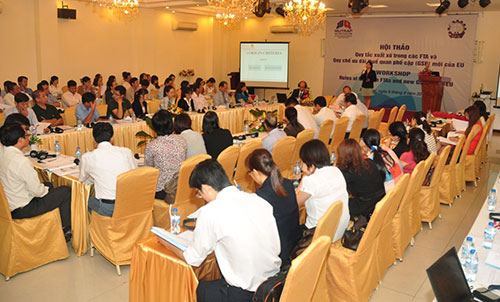Vietnam’s exports benefit from GSP

At yesterday’s conference on principles on origins in free trade agreements and the EU’s new GSP organised by the European Trade Policy and Investment Support Project (EU-MUTRAP) in the southern province of Dong Nai, head of the EU-MUTRAP’s consultant group Claudio Dordi said the resumption of the GSP would help accelerate Vietnam’s exports to the EU, create more employment and further ensure social security in the 2014-2017, thanks to export priorities in this market.
During the 2009-2013 period, all footwear products from Vietnam were removed from the GSP, greatly pressurising domestic producers and exporters. The removal of GSP has averagely increased import duties in the EU market by 3.5-5.5 per cent, while duties on leather and canvas footwear surged to 8 and 17 per cent, respectively.
Hanoi-based Garment Company X26 director Nguyen Viet Thang said that the GSP resumption would help this company earn an additional sum of about nearly $500,000 per year, from exporting its products to the EU market.
“More calculations will needed to be calculated, but our company’s export turnover from the EU will increase,” said Quach Thi Nhung from South Korean-backed garment maker KJ Vina in southern province of Binh Duong.
This year KJ Vina is expected to see its export turnover grow 15 per cent, as compared to 2011.
Last year, the EU was Vietnam’s largest importer which spent $20.3 billion importing Vietnamese goods, with mobile phones (accounting for 43 per cent of Vietnam’s total mobile phone export turnover), footwear (36 per cent), computers (19 per cent) and garments and textiles (16 per cent).
The EU-MUTRAP has a total budget of 16.5 million euros, of which the European Union contributes 15 million euros and the rest 1.5 million euros is from Vietnam. The project has and will be implemented during 2012 and 2017.
What the stars mean:
★ Poor ★ ★ Promising ★★★ Good ★★★★ Very good ★★★★★ Exceptional
Latest News
More News
- Vietnamese businesses diversify amid global trade shifts (February 03, 2026 | 17:18)
- Consumer finance sector posts sharp profit growth (February 03, 2026 | 13:05)
- Vietnam and US to launch sixth trade negotiation round (January 30, 2026 | 15:19)
- NAB Innovation Centre underscores Vietnam’s appeal for tech investment (January 30, 2026 | 11:16)
- Vietnam moves towards market-based fuel management with E10 rollout (January 30, 2026 | 11:10)
- Vietnam startup funding enters a period of capital reset (January 30, 2026 | 11:06)
- Vietnam strengthens public debt management with World Bank and IMF (January 30, 2026 | 11:00)
- PM inspects APEC 2027 project progress in An Giang province (January 29, 2026 | 09:00)
- Vietnam among the world’s top 15 trading nations (January 28, 2026 | 17:12)
- Vietnam accelerates preparations for arbitration centre linked to new financial hub (January 28, 2026 | 17:09)
















 Mobile Version
Mobile Version